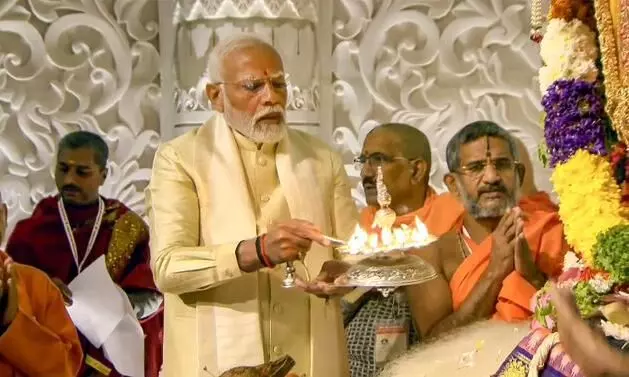
Soul of the Republic
text_fieldsOn January 22, Prime Minister Narendra Modi was praised by the Union Cabinet for the Pran Pratishta held at the Ram Temple built on the site of the demolition of the Babri Masjid in Ayodhya. In the eulogy presented by Union Defence Minister Rajnath Singh, it is said that Narendra Modi, who has fulfilled the five-century old dream of Indian civilization, has become the charioteer of a new age. The felicitation also says that if the body of the country gained independence in 1947, it was on January 22, 2024 that the country got spiritual vitality through Prana Pratishtha. After the advent of the Cabinet system in India and before that during the Viceroy's Executive Council during the British era, there have been many historic activities, but there has never been a unique mission like the one accomplished by the Prime Minister on January 22. The Ram Janmabhoomi Movement is the only movement in independent India which united all sections of the people. The resolution passed by the Union Cabinet reiterates the direction in which the country is heading as it celebrates the 74th anniversary of India's transformation into a sovereign democratic republic that guarantees freedom of thought, expression, belief and worship to all citizens and equality of status and opportunity, and fraternity that guarantees the dignity of individuals and the unity of the nation.
In his speech after the Pran Pratishta ceremony, the Prime Minister had asserted that January 22, 2024 is not just a date in the calendar but the beginning of a new era. tt may be recalled that during the inauguration of the Somanath Temple in 1951, a year after India became a Republic on January 26 1950, the organizers of the temple reconstruction, including KM Munshi, Sardar Vallabha Bhai Patel and others who were members of the Union Cabinet, wished the then President Rajendra Prasad to attend the inauguration ceremony. Rajendra Prasad also wished for the same. On hearing this, Jawaharlal Nehru convened the cabinet and passed a resolution that the first citizen of the country should not attend the ceremony. The cabinet's assessment was that it would be a violation of the fundamental principle of the democratic constitution that the country does not have a specific religion. When it came under pressure, the Nehru cabinet insisted that a constitutional incumbent should not make individual religious practice a state procedure. When he informed me that he would attend as an individual, he was denied the protocol and security of the first citizen for the event. With the same constitution in place happened the construction of the Ram Temple at the site where the Babri Masjid was demolished, the laying of the stone and finally, the inauguration took place under the direct control of the government under the leadership of the Prime Minister. A resolution is passed by praising the Prime Minister who took the lead in all of this and describing the Ram Janmabhoomi movement, which is a party to the dispute that has plunged the country into decades of conflict, as the only people-led movement in independent India.
It turns the truth upside down to say that Hindutva retrograde politics, which has gone through bloody riots since the Ram Janmabhoomi movement leader LK Advani's Rath Yatra, gave life to India. Could this be what the Prime Minister and the BJP intended by the change of era? Be that as it may, Hindutva followers have started to show in which direction the change of times is happening, close to and far away from the Prana Pratishtha location. Its fatal consequences are coming as news of clashes from various quarters. When the Prime Minister preached that Ram is not a conflict but a solution, on Meera Road in Maharashtra the Sangh Parivar were busy starting playing with fire with chants of Jai Shri Ram in the old tradition of the Ram Janmabhoomi agitation. They stirred up tension in Muslim-majority areas by chanting Jai Shri Ram. On the other hand, the Eknath Shinde government, which intervened in the conflict, came with bulldozers, the extermination tool of Sangh Parivar, and demolished the Muslim shops and houses of the victims as illegal constructions. The fire is yet to be extinguished there. In Narayanpet, Telangana, fireworks were thrown at a mosque, and shops were set on fire in Sangareddy. In Jhabua, Madhya Pradesh, 'Yugapiravi' was celebrated by tying a saffron flag on the cross on the top of a church and chanting Jai Shri Ram. The experience of the past is that the Ram Janmabhoomi movement did not unite Indians, as stated in the central government resolution, but only fostered fragmentation through polarization and rivalry. Even when the Sarsangchalak advises them to leave quarrels and controversies, it is seen in many places that riots are being whipped up again in the name of Ram. Meanwhile, the concern of patriots is whether the integrity of Prana Prathishta will keep the secular democratic republic of India intact or will result in the loss of its soul. It's time to pray that this does not happen.


























